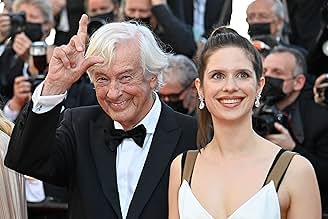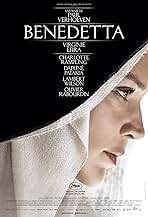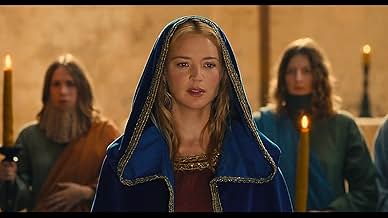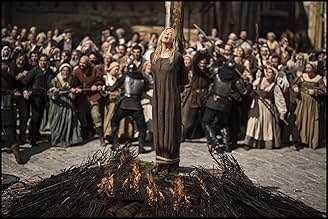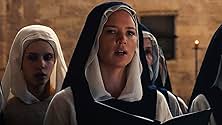Eine Nonne in Italien leidet unter verstörenden religiösen und erotischen Visionen. Ihr steht eine Begleiterin zur Seite, und die Beziehung zwischen den beiden Frauen entwickelt sich zu eine... Alles lesenEine Nonne in Italien leidet unter verstörenden religiösen und erotischen Visionen. Ihr steht eine Begleiterin zur Seite, und die Beziehung zwischen den beiden Frauen entwickelt sich zu einer romantischen Liebesbeziehung.Eine Nonne in Italien leidet unter verstörenden religiösen und erotischen Visionen. Ihr steht eine Begleiterin zur Seite, und die Beziehung zwischen den beiden Frauen entwickelt sich zu einer romantischen Liebesbeziehung.
- Auszeichnungen
- 3 Gewinne & 21 Nominierungen insgesamt
Empfohlene Bewertungen
It's hard to tell if this movie is trying to be realistic while implying some messages on religious hypocrisy, delusion and desires, or if it's just trying to be a fantasy, or even satirical. But it's definitely compelling, exciting and entertaining. It's provocative, crazy and might be annoying to some. Lead performance is solid.
Sex and violence are par for the course for a Paul Verhoeven film, but, one rarely expects it in such copious amounts in a film based on a true story account of a 17th century Catholic nun, Benedetta Carlini. The key word is 'based' for Verhoeven and co-writer David Birke have freely adapted Judith Brown's non-fiction book.
Set in Tuscany, Benedetta is a tale of a young Italian woman (the movie is in French) who claimed to have had vivid visions of Jesus from an early age. Once in a Convent in Pescia, Benedetta (played as an adult by a stout Virginie Efira) rises to the rank of Abbess much to the dismay of the former Mother Superior, Felicita (an excellent Charlotte Rampling). Her manifestations continue and become more graphic even reaching the point of stigmata and speaking in tongues. A rumored affair with a fellow nun, Bartolomea (a mischievous Daphné Patakia) brings suspicion, scorn and charges of heresy in the form of Alfonso (Lambert Wilson; relishing his evil side) who comes from Florence to prosecute the case. The plague is raging and Verhoeven's film boils into a bloodier, sexier take on Ken Russell's THE DEVILS. Something of a MARK OF THE DEVIL for the Cannes crowd.
And yet, Verhoeven has created a work of subversive, yet profound, religiousness. Benedetta's devotion to the lord is never in doubt Her fervor, inspired and deeply felt even when not in keeping with the letter of scripture. Only a filmmaker as fervid as his subject could create at once something so sacrilegious while also remaining true to the essence of the character. There is no question that Verhoeven can never be accused of having good taste (and there are times here where if he pulled back even a little, it would have only improved the work), but, sometimes that seeming contradiction is what can create such stirring art. BENEDETTA is a direct challenge to believers and non-believers alike.
Set in Tuscany, Benedetta is a tale of a young Italian woman (the movie is in French) who claimed to have had vivid visions of Jesus from an early age. Once in a Convent in Pescia, Benedetta (played as an adult by a stout Virginie Efira) rises to the rank of Abbess much to the dismay of the former Mother Superior, Felicita (an excellent Charlotte Rampling). Her manifestations continue and become more graphic even reaching the point of stigmata and speaking in tongues. A rumored affair with a fellow nun, Bartolomea (a mischievous Daphné Patakia) brings suspicion, scorn and charges of heresy in the form of Alfonso (Lambert Wilson; relishing his evil side) who comes from Florence to prosecute the case. The plague is raging and Verhoeven's film boils into a bloodier, sexier take on Ken Russell's THE DEVILS. Something of a MARK OF THE DEVIL for the Cannes crowd.
And yet, Verhoeven has created a work of subversive, yet profound, religiousness. Benedetta's devotion to the lord is never in doubt Her fervor, inspired and deeply felt even when not in keeping with the letter of scripture. Only a filmmaker as fervid as his subject could create at once something so sacrilegious while also remaining true to the essence of the character. There is no question that Verhoeven can never be accused of having good taste (and there are times here where if he pulled back even a little, it would have only improved the work), but, sometimes that seeming contradiction is what can create such stirring art. BENEDETTA is a direct challenge to believers and non-believers alike.
Some film critics in Greece thought that this movie is a hybrid of parody and satire in its attitude towards organized religion. I disagree. Although the treatment of religious themes is rather blasphemous by pietistic standards the amount of human misery and suffering portrayed does not allow the viewer to conceive the movie as satire at least solely as such. Surely the religious visions and the sexual adventures of Benedetta treat religion irreverently but the consequences for her and her protégé Bartolomea have nothing humorous about them. In that time, unlike ours - at least in the West- no jokes were allowed concerning religion.
Misery, violence, intrigue abound in the plot and lust, although explicit, is just one of the sins portrayed. Ambition, struggle for power and precedence, avarice are the prevailing motives of the characters. Christian charity pales before those demonic passions although it is not totally absent.
The plight of the poor, the intrigues of the powerful, the omnipresence of the plague, the violence of the soldiery offer a bleak picture of society. One is reminded of Flesh and Blood by the same director situated in about the same historical period. Both have a central heroine with superb survival skills to help her navigate through insurmountable adversities.
Humour and satire exist but the general atmosphere is so ominous, so laden with menace, violence and disease that you are left saddened with the misery inherent in the human experience of 17nth century Tuscany. Nothing betrays the artistic splendour of the Renaissance, just a bleak struggle for survival and mastery, for power and precedence, for wealth and prestige where Christianity is used to serve those ulterior motives.
It is a sad movie. That said Virginie Efira and Daphne Patakia are gorgeous both artistically and sexually. But I think Charlotte Rampling in the role of the abbess gives the more memorable performance as a character full of ambiguity and contradictions. Lambert Wilson shines as the satanic nuncio although his character is rather flat in his evil propensities.
The costumes and the representation of the era are superb and the religious visions of Benedetta are far-fetched and subversive. Pietistic believers are going to be offended and will probably say: would he dare to do the same with Muslim religious symbols? But I do not think that the movie is anti-Christian. It shows how lofty ideals are used by flawed humans to further very earthly ambitions.
It is true though that without divine solace the society portrayed by Benedetta would be impossible to live in. Watch the movie and form your own opinion.
Misery, violence, intrigue abound in the plot and lust, although explicit, is just one of the sins portrayed. Ambition, struggle for power and precedence, avarice are the prevailing motives of the characters. Christian charity pales before those demonic passions although it is not totally absent.
The plight of the poor, the intrigues of the powerful, the omnipresence of the plague, the violence of the soldiery offer a bleak picture of society. One is reminded of Flesh and Blood by the same director situated in about the same historical period. Both have a central heroine with superb survival skills to help her navigate through insurmountable adversities.
Humour and satire exist but the general atmosphere is so ominous, so laden with menace, violence and disease that you are left saddened with the misery inherent in the human experience of 17nth century Tuscany. Nothing betrays the artistic splendour of the Renaissance, just a bleak struggle for survival and mastery, for power and precedence, for wealth and prestige where Christianity is used to serve those ulterior motives.
It is a sad movie. That said Virginie Efira and Daphne Patakia are gorgeous both artistically and sexually. But I think Charlotte Rampling in the role of the abbess gives the more memorable performance as a character full of ambiguity and contradictions. Lambert Wilson shines as the satanic nuncio although his character is rather flat in his evil propensities.
The costumes and the representation of the era are superb and the religious visions of Benedetta are far-fetched and subversive. Pietistic believers are going to be offended and will probably say: would he dare to do the same with Muslim religious symbols? But I do not think that the movie is anti-Christian. It shows how lofty ideals are used by flawed humans to further very earthly ambitions.
It is true though that without divine solace the society portrayed by Benedetta would be impossible to live in. Watch the movie and form your own opinion.
This movie was banned from film distribution in Russia so I started watching in hopes of explicit scenes and 'forbidden fruits', but continued thanks to the acting work of Charlotte Rampling. What a marvelous actress.
A Paul Verhoeven movie about nuns? Do I need to say more? Well, perhaps. Of course, we get our fair share of nude nuns minus, in this instance, those big guns and a copious amount of sex and violence but this is no cheap exploitation picture even if it is unlikely to recieve the Vatican's Good Housekeeping Seal of Approval. Verhoeven's "Benedetta" doesn't just sail close to the wind but to Christians, and to Catholics in particular, is positively sacrilegious.
It's the story of a nun, Benedetta, in 17th century Tuscany, (Virginie Efria), whose devotion, first to the Virgin Mary and then to Jesus, takes, shall we say, somewhat extreme forms. As a 'Bride of Christ' Benedetta sees him not just as a vision but very much in the flesh and tends to take her wifely duties literally though she is also inclined to dally in her more earthly sphere with another nun, (Daphne Patakia). Naturally, this leads Benedetta into all sorts of trouble with the Church authorities.
Verhoeven tends to take all of this fairly seriously though the nudity, the violence, the visions and the swearing do add to a sense of jocularity as well. It's certainly a terrific looking picture with a real sense of period and without the sex and violence it could fit quite easily into the category of 'religious epic'.
There's a lot here we've seen before but equally there is a lot that is both new and shocking but shocking in a very Verhoevenian kind of way. Even at its most serious I kept feeling his tongue was lodged very firmly in his cheek, certainly by the time we move into the territory of "The Devils" and "The Exorcist". The one member of the cast who seems to know exactly what is intended is Charlotte Rampling as the Mother Superior and once again Rampling simply walks off with the picture. Unfortunately, in the version I saw, the subtitling was very poor, even to the extent of distorting the meaning. What is certain is that "Benedetta" is no 'Sound of Music' and this is one nun's story unlikely to be shown in the convent anytime soon.
It's the story of a nun, Benedetta, in 17th century Tuscany, (Virginie Efria), whose devotion, first to the Virgin Mary and then to Jesus, takes, shall we say, somewhat extreme forms. As a 'Bride of Christ' Benedetta sees him not just as a vision but very much in the flesh and tends to take her wifely duties literally though she is also inclined to dally in her more earthly sphere with another nun, (Daphne Patakia). Naturally, this leads Benedetta into all sorts of trouble with the Church authorities.
Verhoeven tends to take all of this fairly seriously though the nudity, the violence, the visions and the swearing do add to a sense of jocularity as well. It's certainly a terrific looking picture with a real sense of period and without the sex and violence it could fit quite easily into the category of 'religious epic'.
There's a lot here we've seen before but equally there is a lot that is both new and shocking but shocking in a very Verhoevenian kind of way. Even at its most serious I kept feeling his tongue was lodged very firmly in his cheek, certainly by the time we move into the territory of "The Devils" and "The Exorcist". The one member of the cast who seems to know exactly what is intended is Charlotte Rampling as the Mother Superior and once again Rampling simply walks off with the picture. Unfortunately, in the version I saw, the subtitling was very poor, even to the extent of distorting the meaning. What is certain is that "Benedetta" is no 'Sound of Music' and this is one nun's story unlikely to be shown in the convent anytime soon.
Wusstest du schon
- WissenswertesProduction ended November 2018, and the film was initially scheduled for release at the Cannes Film Festival in 2019, but in December 2018, director Paul Verhoeven had to undergo surgery for a hip injury suffered due to the set's location, which involved lots of hills and climbing. Post-production in Amsterdam had to be delayed until June 2019 to allow time for him to recover from his surgery. However, subsequent complications from pain medication caused an intestinal obstruction that ended in a life-threatening colon perforation; fortunately, Verhoeven's wife urged him to go to the hospital in time. Verhoeven and producer Saïd Ben Saïd agreed to delay the release to 2020 in order for Verhoeven to recover, and be fully present during the post-production process. Verhoeven still credits his editor Job ter Burg for finishing much of the film on his own while he himself was recovering and unable to attend. Eventually, the world-wide COVID-19 pandemic caused the movie to be delayed for another year.
- PatzerAfter the nuncio has demonstrated the pear of anguish, it is nearly closed again, but when he hands it to the torturer it is suddenly opened.
- Zitate
Benedetta: Pride is a sin.
Soeur Jacopa: We're all entitled to a sin. What's yours?
- VerbindungenFeatured in Javo & Temoc: Top 10 Películas: Lo "mejor" del año (2022)
Top-Auswahl
Melde dich zum Bewerten an und greife auf die Watchlist für personalisierte Empfehlungen zu.
- How long is Benedetta?Powered by Alexa
Details
- Erscheinungsdatum
- Herkunftsländer
- Offizielle Standorte
- Sprachen
- Auch bekannt als
- Blessed Virgin
- Drehorte
- abbaye cistercienne, Le Thoronet, Var, Frankreich(convent interiors)
- Produktionsfirmen
- Weitere beteiligte Unternehmen bei IMDbPro anzeigen
Box Office
- Budget
- 24.350.000 $ (geschätzt)
- Bruttoertrag in den USA und Kanada
- 354.481 $
- Eröffnungswochenende in den USA und in Kanada
- 136.839 $
- 5. Dez. 2021
- Weltweiter Bruttoertrag
- 4.265.353 $
- Laufzeit2 Stunden 11 Minuten
- Farbe
- Sound-Mix
- Seitenverhältnis
- 2.39 : 1
Zu dieser Seite beitragen
Bearbeitung vorschlagen oder fehlenden Inhalt hinzufügen








